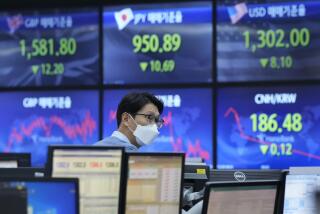Japan takes big step to revive economy
Japan’s central bank took a massive bet to reset its economy and pull out of nearly two decades of deflation.
The Bank of Japan announced an aggressive and ambitious plan Thursday to expand its purchase of long-term bonds and double the amount of money in circulation, all in an effort to boost inflation to 2% within two years and stimulate consumer and business spending.
The move stoked the Japanese stock market, which gained 2.2% on Thursday and continued rising early Friday, and sent the yen plunging against the dollar.
The lower yen, economists said, will make Japanese cars, electronics and other exports more affordable in the U.S., but also will make American exports more expensive in Japan, the world’s third-largest economy.
Robert Dekle, a USC economist specializing in Japan’s economy, said the actions would probably benefit both Japan and the U.S. With some European countries in recession and world trade lagging, the U.S. is looking for any efforts to strengthen the global economy, he said.
“The U.S. is not a direct competitor of Japan in a lot of sectors,” he said, so growth in the Japanese economy would not be a threat to U.S. exports and, in fact, would help eventually to increase sales of American goods in Japan.
The Bank of Japan’s move came two weeks after Haruhiko Kuroda took the helm at the central bank.
Kuroda has vowed aggressive action to help turn around the economy, which suffers from long-standing structural problems, such as an aging population and inflexible labor regulations.
In addition, Japan’s economy has stagnated with persistent deflation, a decrease in the general price levels of goods and services, which in turn depresses wages, profits, spending and hiring.
After a two-day policy meeting, board members of the central bank voted unanimously to buy Japanese government bonds, as well as exchange-traded funds, to help stimulate the country’s economy.
By expanding its monetary base by as much as $70 trillion yen, or about $730 billion, a year until the 2% inflation target is met, the central bank hopes to lower interest rates on loans to encourage businesses and consumers to borrow and spend.
Automakers such as Toyota and electronics giants such as Sony are expected to be more competitive with lower prices.
“For U.S. consumers, it means somewhat cheaper Japanese goods,” Dekle said. It also means that Japanese automakers, already popular in the U.S., may be able to make stronger inroads into the market shares held by Detroit’s Big Three: General Motors Co., Ford Motor Co. and Chrysler.
Dan Akerson, GM’s chief executive, told CNBC-TV that he feared the Bank of Japan’s policies would give Japanese automakers a price advantage over GM in the United States.
“They’re an export economy,” Akerson said. “You have to be suspicious of what they’re doing and why.”
But the Japan Automobile Manufacturers Assn. USA warned that a lower yen wouldn’t necessarily translate into lower prices for Toyotas and Nissans.
“Currency changes affect a wide variety of economic factors in different directions, but at a minimum, you have to take into consideration that nearly 70% of Japanese sales in the U.S. are produced here and therefore are not affected by currency changes,” said Ron Bookbinder, the group’s general director.
Many economists said the rest of the world would benefit too. A faster-growing Japan will buy more products and services from the United States, China and Europe, helping boost their economies.
Japan’s stimulus follows a similar move by the U.S. Federal Reserve, which is going through its third round of buying U.S. bonds in an effort to keep interest rates low and spur businesses and consumers to borrow and spend.
The Fed has signaled it would phase out its quantitative easing policy once the labor market recovers.
The European Central Bank said last week it also was considering a similar move to encourage borrowing.
Japan faces some risk, experts said. If parts of the economy grow faster than others, for instance, inflation could rise before wages catch up. That would damp consumer spending.
Despite the aggressive action, Dekle said he was skeptical that the Bank of Japan would see 2% inflation within two years.
Past efforts by the Bank of Japan, economists said, have been too incremental and ineffective. Kuroda’s predecessor had balked at calls by Prime Minister Shinzo Abe to take more aggressive action to combat the longtime deflationary pressures.
Abe is pushing for deregulation of industries to help make companies more competitive. Such action is expected to run into political opposition.
--
ricardo.lopez2@latimes.com
The Associated Press was used in compiling this report.
More to Read
Inside the business of entertainment
The Wide Shot brings you news, analysis and insights on everything from streaming wars to production — and what it all means for the future.
You may occasionally receive promotional content from the Los Angeles Times.











